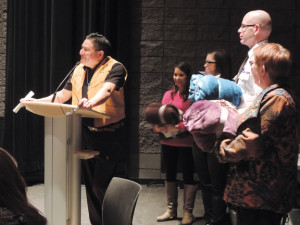Residential School Survivors Honoured As Part of Healing and Reconciliation Week
By Peggy Revell
Hope for healing, hope for understanding, hope for the future. “People are going to learn to get together from all of this … I feel it,” said Winston Wadsworth, following Wednesday’s banquet in honour of those like himself who are survivors of Canada’s residential school system — one of many ceremonies and events marking Healing and Reconciliation week in Medicine Hat, and organized by the Miywasin Centre and the Blood Tribe Department Inc. For Wadsworth, the week has been a special one as it brings people together. He hopes it helps people understand what indigenous people have been through, to understand, for example, the “why” when they see a homeless aboriginal person. The week has included often an emotional sharing of stories by elders and survivors like Wadsworth —of being taken away from their families at a young age for months and years at a time, of being beaten, abused, denied their culture and language, of growing up with parents who also survived residential schools, of how many turned to drugs and alcohol, of the friends and family they’ve lost. It’s a change from silence that once existed about residential schools, said Wadsworth, who himself took a “long, long time” to finally be able to speak about his own experience. “I’m very glad that it’s being told to people of Canada … for people to understand what has happened to indigenous people right across Canada,” said Wadsworth. “I don’t think people believe this happened. Now people are starting to believe it’s true, what happened in these schools to children.” He hopes learning about residential schools becomes part of school curriculum, and says events like this week shouldn’t be the end. “I’m hoping people attend these events. They tell their friends, their fellow workers. We need for the people of Canada to know all this.” The week has been “extremely successful” so far, said Sabrina Prince with the Miywasin Society, with a good attendance at Monday’s Sacred Fire Ceremony, documentary movie night at the Monarch Theatre, and Wednesday’s banquet — including much appreciated attendance by local police, municipal leaders and churches. All are invited to today’s “Walk for Reconciliation” starting at 9 a.m. at the Esplanade with more ceremonies and a walk along the river path. A photo exhibit on residential schools and closing ceremony will also take place from 9 a.m. to noon on Friday at the Esplanade. Government-funded, church-run residential schools in Canada stem back to the 1870s, with the last one closing in 1996. There were more than 130 residential schools across the country, and the Truth and Reconciliation Commission of Canada says more than 150,000 First Nations, Metis and Inuit children were made to attend them. The TRC estimates there are 80,000 former students living today. In many cases, children were forbidden from speaking their language and practising their culture, while testimonies over the past decades have exposed abuse, negligence, missing children and death at these schools.
|
.
Any original material on these pages is copyright © BishopAccountability.org 2004. Reproduce freely with attribution.
